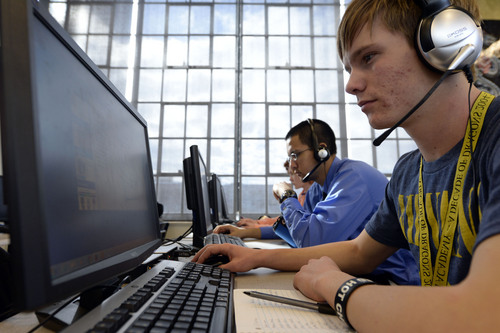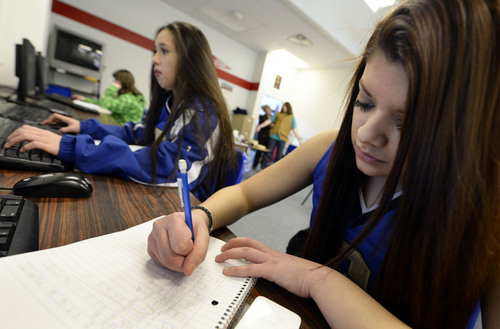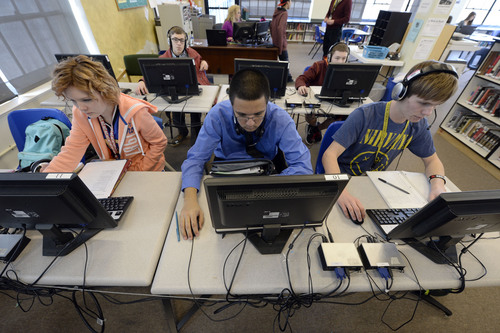This is an archived article that was published on sltrib.com in 2014, and information in the article may be outdated. It is provided only for personal research purposes and may not be reprinted.
Two private companies are being paid millions in Utah tax dollars to recruit online students who boost enrollment for mostly charter schools — on paper.
The schools contract out the students' online education back to the same companies that recruited them. Some schools then pay little attention to student performance, attendance, or progress toward graduation, leaving it to the private company, a new state audit says.
Many of the charter students take only a few classes online, the Utah State Office of Education audit found, but their school gets paid as if they are full time.
The audit estimates that $10.5 million in state money is flowing through schools this year and into the coffers of Harmony Educational Services, based in Provo, and My Tech High Inc., of Spanish Fork. The companies offer parents cash incentives, such as technology allowances.
Sen. Deidre Henderson, R-Spanish Fork, calls these kids "ghost students." The schools "don't manage them. They don't interact with them," she said.
Instead, "They are students of a private company who used public funds to essentially bribe students and then assigned them to a public school," said Henderson, whose own children attend a charter school. She also serves on the board of Mountain Heights, a virtual charter school.
The audit says the two companies manage the instruction of an estimated 2,550 students, many of them formerly home-schooled children.
Tim Beagley, chairman of the Utah State Charter School Board, said charter schools live and die on enrollment. If they build for 400 and get only 200 students, "they've got a pretty desperate situation." He added: "I believe these two companies took advantage of that."
My Tech founder Matthew Bowman and Harmony President John Thorn said critics have it wrong. They said they offer students innovative alternatives and welcome clearer policies.
"Tell us how you want us to do things," Bowman said. "We're in this for the long haul."
—
Rules ignored, or missing • The 52-page audit found lax management throughout online programs at Utah schools, particularly among those that let outside companies manage students' education.
At least eight charter schools will soon receive warning letters from the state charter school office, said Marlies Burns, who oversees charters. The letters are the first step toward charter revocation if they don't fix the problems the audit identifies.
One district school that also contracts with My Tech and Harmony, Provo's eSchool, also has been put on notice to make changes.
Besides the failure to track students, the audit said, schools take the companies' word for it that teachers are all licensed in Utah and have passed background checks, and that the classes are up to Utah's core-curriculum standards.
Schools are not following Utah's truancy and compulsory education laws, though part of the problem is lack of clarity on what the rules mean for students who take classes on home computers, the audit showed.
At least one school and its contractor are getting state money for teaching home-school courses, which do not qualify for funding.
The audit also found schools did not follow state procurement laws requiring competitive bidding, which the state education office has to report to the attorney general's office for investigation.
Some charters are providing online classes when their charters don't say they can, which is a finding that disturbs Chris Bleak, president of the Utah Association of Utah Charter Schools. "We advocate and pride ourselves on adhering to our charters."
In instance after instance, the audit notes that schools are either ignoring rules or there are no rules. David Thomas, vice chairman of the Utah State Board of Education, acknowledges the board has a lot of work to do.
"It was a good wake-up call in terms of this brave new world of online programs and distance learning," said Thomas, head of the board's audit committee.
Schools, too, need to manage all students' education — not just those physically in front of them.
"You can't just outsource it to an online program," Thomas said. "You have to have supervision."
—
Smell test • The audit does not use Henderson's word — bribe — but it does explain how Harmony and My Tech give families some of the taxpayer dollars the companies receive from public schools.
According to the audit, Harmony offers parents $300 per student when they enroll. Parents also can get up to $500 more in reimbursements for curriculum they purchase and up to $35 a month for music lessons, the audit says.
Families who go through My Tech get a $300 technology allowance ($400 the second year) for buying laptop computers, digital cameras or other gear. They also can be reimbursed up to $300 per student for buying courses from other providers and $150 for custom-building courses for their children.
Burns said other charter schools have been allowed to hand out gadgets, but on the condition that they remain the property of the school.
Beagley, the charter board chairman, said that even if there is no explicit rule yet forbidding such incentives, "that (practice) doesn't pass anybody's smell test."
But Bowman, My Tech's founder, said the money "is helping the students get the curriculum and technology they need."
He also likened it to a brick-and-mortar school building nice facilities to attract students. "If a school builds a (fancy) football stadium, is that 'smell-test' bad?"
My Tech helps "parents personalize their education for each child and give them access to technology and entrepreneur education, and we map to the Utah core standards," Bowman said.
Thorn, Harmony's president, said in an email that his company has brought together two groups with needs: schools that want to pioneer innovative approaches to delivering education and "students (who) have yearned for a more individualized and flexible education through the public school system."
Harmony was founded by Robert Muhlestein, a former state senator.
The audit, Thorn wrote, "pointed out some areas that the state boards of education and the Legislature have needed to address for some time in regard to how public schools should and can deliver online, blended, and competency-based education."
—
Changes underway • Provo District's 4-year-old eSchool gives students around the state several options. If they come to the school, they're given the choice of K12, a major national provider of online curriculum, or BYU Independent Study.
But enrollment really took off when the school contracted with My Tech last year, and Harmony this year. The two companies bring in 700 of eSchool's 1,200 students, said Megan Dunnigan, school coordinator.
Some parents and students are reluctant to deal directly with a public school, she said.
"They know they're in a public school. They test just like in a public school," she said. "But for whatever reason, they feel more comfortable having this advocate, this go-between."
Dunnigan said the majority of students used to be home-schooled. Bowman said those using My Tech also come from other charter and traditional schools.
At eSchool, it's already making changes called for in the audit, Dunnigan said. It has done the research to confirm that Harmony and My Tech teachers have Utah licenses and have passed background checks.
And the school now has the go-ahead to hire another staffer to ensure all curriculum is aligned with Utah core standards and that teachers are qualified.
"We're glad the state is recognizing this is becoming a bigger and bigger option for students," Dunnigan said.
DaVinci Academy of Science and Math in Ogden contracted with Harmony on the promise the company could help fill the school as it expanded into the lower grades.
Harmony had strong relationships with home-schooling parents, and the school saw them as underserved, says DaVinci board chairman Gary Nelson. "To say we use them just to fill slots is being very cynical," he said.
This year, the first that DaVinci has grades kindergarten through 12th, its elementary has 532 online students and 132 on-site students. (Harmony serves only the school's elementary students).
DaVinci Director Fred Donaldson said the school has already done much of what the audit requests. The school's board changed the administrative structure, moving Donaldson so he oversees the entire school, and hired more IT people.
It's using a new management system to better track and communicate with families, and all registration will be through DaVinci, not Harmony.
Donaldson, though, said it would be easier not to contract with a company such as Harmony. Online education is managed by the school for seventh through 12th grades, and he believes that works better.
"The cost is a wash, whether you're paying a contractor or doing it yourself," Donaldson said. "But it's easier to do it yourself."
Twitter: @KristenMoulton —
Audit: Flaws found in Utah's K-12 online, distance education
Among the findings in a 52-page Utah State Office of Education audit of online and distance learning in public schools:
• Some schools contract with private companies to provide online education, then pay little attention to student performance, attendance or progress toward graduation.
• Some schools don't verify that teachers in the private online programs are licensed in Utah and have passed background checks, or that classes follow Utah's core curriculum standards.
• At least one school and its contractor are getting state money for teaching home-school courses, which do not qualify for funding.
• Some charters are providing online classes when their charters don't say they can.
• Some schools did not follow state procurement laws requiring competitive bidding, which the state office has to report to the attorney general's office for investigation. —
Online, distance learning: Who was audited?
The Utah State Office of Education's new audit on online and distance learning found lax management on the part of many schools.
Fifteen of Utah's 90 charter schools and 23 of the state's 41 school districts have online or distance-learning programs.
Among the handful audited:
Districts or schools that manage the programs themselves generally do a better job, the audit found.
The audited schools in that category were Alpine Online (Alpine District), Utah Online (Washington District), and three charters: Utah Virtual, Utah Connections and Mountain Heights.
Schools that contract with two Utah companies generally have been more hands-off, letting the companies manage the students' education, the audit said.
Those schools included one district school, Provo's eSchool, as well as charters C.S. Lewis, DaVinci, Rockwell, American Leadership and Gateway Preparatory.
Auditors also gathered basic information from these charters but didn't audit them: Pioneer High, Mana, Aristotle and Pacific Heritage.









